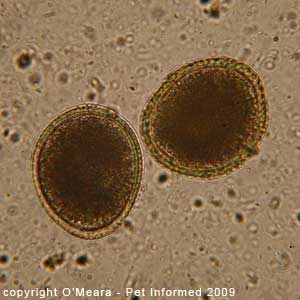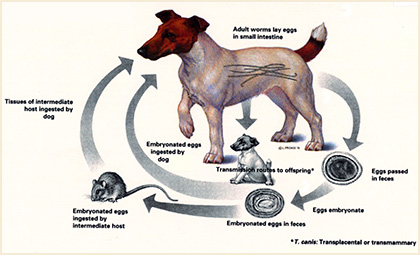 |
| Source |
Another fairly common type worm that can be identified in
your pet’s stool are roundworms! Unlike some of the other worms (whipworms and
hookworms), roundworms are easily found in both cats and dogs. These will
sometimes look like spaghetti noodles if you see the actual worm in the stool
or even sometimes in vomit. It is also possible to see the eggs under the
microscope like many of the other intestinal parasites.
 |
| Source |
There are many way dogs can become infected. The eggs can be
picked up from the environment or by eating a rodent that is infected with the
worm. They can also be transmitted to unborn puppies as well as nursing puppies
through the milk. Cats are mostly the same in how they can contract this worm,
however they are not passed to unborn kittens, young will typically get it form
nursing. It is even more common for grown cats to get from soil. Even indoor
cats are at risk as the soil in potted plants can carry the eggs as well. This
is another excellent reason why we recommend de-worming all puppies and kittens
and routine screening of adult animals.
 |
| Source |
As mentioned above the symptoms are usually confined to the
GI tract which includes vomiting and diarrhea, sometimes with the worms
present.
 |
| Source |
There is a risk to humans. It is very important to practice
good hygiene. This includes regular hand. It is also ideal to clean up stool
daily so that it does not have time to contaminate the environment.
Discouraging dogs from licking people is also a good idea as their mouths could
have been exposed to the worms from the environment. Even if you don’t have
pets public areas such as parks where stray animals could have been can pose a
threat. This is where active hand washing and keeping things out of mouths is a
great idea! It is also wise to check stool samples regularly to ensure your pet
is not infected even if they are not showing symptoms.
 |
| Source |
Keeping pets on monthly flea and heartworm prevention can
reduce the risks of many of these parasites developing. It is also a great way
to promote the overall health of your companion. If you are interested in more
information on intestinal parasites such as round worms click here. Again you
can always call your veterinarian with any questions or concerns!
No comments:
Post a Comment